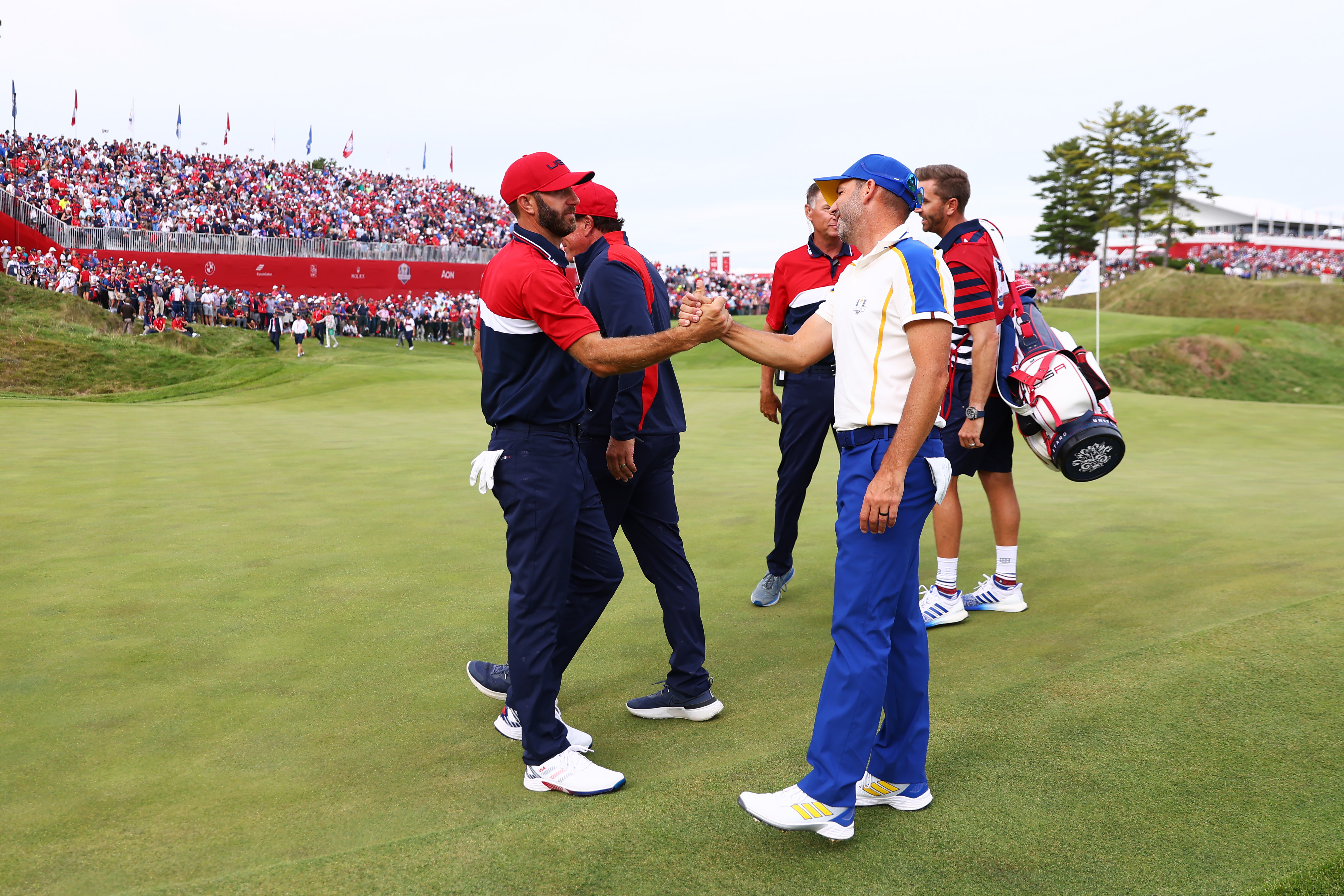The 43rd Ryder Cup is in the books. Congratulations to both teams for a terrific show! The biennial competition pitting the United States team against their European counterparts continues to be one of the marquis events in sports. But it wasn’t always that way.
Following World War II, the American squad was victorious in 10 of 11 encounters leading up to the 1969 matches at Royal Birkdale Golf Club. That year, Ryder Cup rookie Jack Nicklaus battled Tony Jacklin in the final singles match. Coming to the 18th green, their mano-a-mano duel was deadlocked, and the overall team competition was tied at 15.5-points apiece. Nicklaus sank a 4½-foot putt to save par. Without hesitation, he picked up Jacklin’s coin (ball marker) and conceded the two-foot par putt. Nicklaus uttered the now-famous words, “Tony, I know you’d never miss this putt, but I’m not going to ever give you the chance.” The “Concession” led to the first tie in Ryder Cup history. (The Americans retained the Cup as a result of winning the matches in 1967.)
To commemorate the seminal moment, the PGA of America, Ryder Cup Europe and Aon established the Nicklaus-Jacklin Award presented by Aon. “Since Aon became a worldwide partner of the Ryder Cup, we’ve been working together to create an award that would be innovative and authentic to the event, while bringing Aon’s purpose and values to life,” said Carlo Clavarino, Executive Chairman, International, Aon. “This decision by Jack was made with a clarity and confidence that reflects everything the Ryder Cup embodies and how our colleagues work on a daily basis to enable businesses to make better decisions.”
The Nicklaus-Jacklin Award presented by Aon recognizes one player from each team who embodies the spirit of the Ryder Cup and displays decision-making prowess that raises the level of sportsmanship, teamwork, and performance. The selection committee includes four former Ryder Cup captains and players—Nicklaus, Jacklin, Paul Azinger and Paul McGinley—as well as Jim Richerson, President of the PGA of America, Alan White, Chairman of the PGA of Great Britain and Ireland, and Aon’s Carlo Clavarino. The committee members coupled their experience and expertise with supporting data (captured real-time during the event) to determine the award recipients. “Obviously, a lot of big decisions have to be made within the cauldron and pressure of the Ryder Cup,” said McGinley, who was on the winning team in all six Ryder Cups that he was involved in. “Making the right decisions at the right time and, most importantly, for the right reasons is what this award is about.”
The inaugural winners, Dustin Johnson and Sergio Garcia, exhibited character, leadership, rock-solid decision making and dazzling play at Whistling Straits. “There’s immense pressure in playing for your teammates, and representing your country,” said Azinger, who had a front-row seat to the matches as the television analyst for NBC/Golf Channel. “Every decision is scrutinized and second-guessed. Both DJ and Sergio played awesome golf. And let’s not lose sight of the tremendous impact they had on their playing partners and all their teammates.”
At Whistling Straits, Johnson and Garcia delivered record-setting performances. DJ tallied a perfect 5-0-0 record, becoming the first U.S. Team member to do so in 42 years and only the fifth player ever. Sergio went 3-1-0 and was one of only two European team members with a winning record.
Now 41-years old, he’s brought his best stuff to the Ryder Cup (10 appearances in all) since he was a teenager. In the process, Sergio’s built a legendary résumé—most matches won (25) and the all-time points leader (28.5).
Their influence went well beyond the wins and losses, though. Johnson, 37, was the elder statesman of the youngest-ever United States squad. Captain Steve Stricker paired him with a couple of Ryder Cup rookies, Xander Schauffele and Collin Morikawa, in the Fourball and Foursomes matches. Morikawa was effusive in his praise: “DJ’s an amazing player and he’s a great guy. He really made the first two days a little easier on me.” Morikawa added, “He’s the oldest guy on our team, and it’s a very quiet leadership, but he makes his presence known. When he needs to say something, he says something. He’s going to be there when you really need it. And if you don’t, he’s going to let you do your thing.” Johnson, of course, was quick to deflect the plaudits. “For the first four matches, I had great partners… we played great together and gelled really well… all 12 of us showed great teamwork and came together as a team.”
Garcia sees the bigger picture as well and displays a wonderful appreciation for the spirit of the Ryder Cup matches. “I just love it. I love being next to my partner. I love hugging him. I love pushing him. I love cheering for him and I love him cheering for me,” he said. “I’ve been fortunate to do it for many years and I’m so proud to be a part of Team Europe.” Sergio’s most impactful moment? It might’ve been the show of support for teammate Rory McIlroy, who struggled to find his game. “I told him that not only me but the whole team is proud of him no matter if he goes 5-0 or 0-5; that we love him and that we are always proud of the effort that he makes and the heart that he puts into his golf and into the team.”
Two of the game’s fine ambassadors. The outwardly quiet one and the player who wears his emotions on his sleeve. Both epitomize what the Ryder Cup stands for and richly deserve the inaugural Nicklaus-Jacklin Award presented by Aon.

